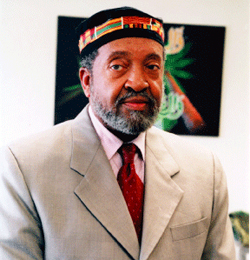 He turned the Nation of Islam towards the East and incorporated the fundamentals of Orthodox Islam to his followers.
He turned the Nation of Islam towards the East and incorporated the fundamentals of Orthodox Islam to his followers.
Imam Warith Deen Mohammed, the spiritual leader of the American Muslim Community, and the son of the Honorable Elijah Muhammad and Sister Clara Muhammad, died on September 9, 2008. He was 74. He assumed the leadership of the Nation of Islam (Nation) in 1975 and began dismantling the Nation bringing it closer to traditional “Orthodox” Islam. He rejected his father’s teachings and eventually changed the name of the followers to Bilalian and the “Muhammad Speaks” newspaper to “Bilalian News.” Ministers became Imams and mosques became masjids.
In deconstructing the Nation, Mohammed seemed more focused on religion and spirituality than the rigidity that some of the Muslims considered as a way of life. He disbanded the Fruit of Islam (FOI) and allowed the Muslims to choose their dress-wear as long as they maintained a modicum of modesty.
In the larger society, Mohammed reached out to other religions and sought to be inclusive rather than exclusive. He was reportedly fluent in the Arabic language and well versed in the Holy Qu’ran, the Holy Book of the Muslim Scriptures. Mohammed’s shift towards traditional Islam won him many “friends” at home and abroad, particularly in the Muslim World. He was the first Muslim to give an invocation in the United States Senate and in 1993, the Imam gave the prayer during the first Inaugural Interfaith Prayer Service for President Bill Clinton.
Imam Abdul Karim Hasan, the resident Imam of Masjid Felix Bilal had known Mohammed for decades, personally, socially and as a religious leader. “He was a great inspirational leader, and he, with the help of God, was responsible for turning us in the direction of mainstream Islam,” Hasan said. “Because of his efforts, we were able to make great strides and progress in every city because of the decentralization of the community, making each Imam responsible for his own growth and development there.”
As the minister responsible for the Nation’s businesses in Mosque No. 27, Hasan was keenly aware of the fundamental difference between the past and the present, as espoused by Mohammed. Hasan continued, “He was directing business activities and also encouraging Muslims to forget about their past injustices and start looking towards the future. He was a member of the World Council of Mosques which is headquartered in Mecca, Saudi Arabia, and through that office, he was able to introduce to them the vastness of the American community of Muslims.”
Malik Saleem, who labored for the Honorable Elijah Muhammad and then as a follower of the Imam, had some pleasant memories. “What impressed me the most is that he said if Black people take care of their family and let your family be your number one priority, he, as a leader will be a happy man! He told us, those of us who labored for the Honorable Elijah Muhammad and gave up our college careers, go back to college and get those college degrees; that this is our country and in order to benefit from it, we should be able to give a minimum to the military service of our country, which I had already been in the Air Force, but these are the things that inspired me.”
Rev. Eric Lee, president of SCLC said, “Anyone who embarks on a course to lift humanity to a higher level is a noble calling. The loss of Warith D. Mohammed will be a loss to all of our community and all of mankind.”
Some of the ministers who were in the Nation looked to Mohammed for guidance when he assumed the leadership mantle. Murad Bekkah was one of those ministers and on hearing that the Imam had passed, he said, “The religious community has lost a strong voice for change. Even though Imam W.D. Muhammad took the Nation in a different direction than his father, he did what he did the best way he know how and was always a sincere and spiritual leader.”
There are many in the Black community whose lives have been changed through the teachings of Islam. Mohammed Mubarak, a well-known artist and photographer, is one of those Muslims. He commented, “He brought African Americans into traditional Islam and he was one of our great leaders and pioneers who taught true Islam to African Americans.”
Another Muslim—also a professional photographer—is Malcolm Ali, who said, “All of humanity have lost one of the greatest minds that have ever been produced. He came out of a poor Black man from Georgia, Elijah Muhammad. He was a man for all of the people; all religions, all cultures, he crossed all lines. He related to every body. His message will go down in history as a message to heal humanity.”






